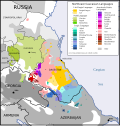[ ], / / and ⟨ ⟩, see IPA § Brackets and transcription delimiters. In linguistics, fortis (/ˈfɔːrtɪs/ FOR-tiss; Latin for 'strong') and lenis (/ˈliːnɪs/...
17 KB (1,820 words) - 06:28, 11 January 2025
Irish phonology (section Fortis and lenis sonorants)
phonemes, as summarized in the following table. As for fortis and lenis ⟨m⟩, in time the lenis version (nasalized semivowel or labial fricative) came...
73 KB (7,280 words) - 21:10, 5 June 2025
Tongue twister (section Fortis and lenis)
when trying to pronounce certain tongue twisters. Fortis and lenis are the classification of strong and weak consonants. Some characteristics of strong...
18 KB (2,084 words) - 16:55, 17 June 2025
Standard German phonology (redirect from Ich-Laut and ach-Laut)
opposition of fortis /s/ ([s]) and lenis [z̥]. In varieties from Northern Germany, lenis stops in the syllable coda are realized as fortis stops. This does...
100 KB (10,317 words) - 00:48, 23 June 2025
Proto-Basque language (category Harv and Sfn no-target errors)
Occlusion: fortis stops and sibilants were fully occlusive, their lenis counterparts only partially so; fortis sibilants thus were affricates, lenis sibilants...
16 KB (1,382 words) - 06:35, 12 May 2025
Basel German (section Lenis plosives)
between /x/ and /r/ is neutralised, as is the distinction between lenis and fortis consonants in clusters. Basel German also has more lenis sounds in word-initial...
12 KB (1,460 words) - 02:56, 4 February 2024
pairs, as in other Alemannic varieties. These pairs are usually called fortis and lenis. They are not distinguished by voicedness, but they differ in length...
12 KB (1,160 words) - 16:54, 6 October 2023
terms fortis and lenis are often used to describe a binary opposition between a series of consonants with higher (more positive) VOT, defined as fortis, and...
12 KB (1,507 words) - 09:48, 7 January 2024
Zapotec languages (section Fortis and lenis)
languages, fortis typically corresponds to voicelessness and extra length in obstruents and extra length in sonorants. Lenis corresponds to voicing and less...
61 KB (6,520 words) - 11:21, 7 February 2025
unstressed syllables and a complex set of phonological features that distinguish fortis and lenis consonants (stops, affricates, and fricatives). Phonological...
116 KB (12,299 words) - 20:20, 23 June 2025
Tenseness (redirect from Tense and lax vowels)
Southern German. German linguists call the distinction fortis and lenis rather than tense and lax. Tenseness is especially used to explain stop consonants...
7 KB (958 words) - 13:11, 21 June 2025
fortis in Wiktionary, the free dictionary. Fortis may refer to: Fortis (Swiss watchmaker), a Swiss watch company Fortis Films, an American film and television...
2 KB (251 words) - 18:11, 10 October 2024
Voice (phonetics) (section Voice and tenseness)
contrast in tenseness, called a fortis and lenis contrast. There is a hypothesis that the contrast between fortis and lenis consonants is related to the...
12 KB (1,376 words) - 14:52, 3 January 2025
the lenis sounds to be devoiced in that position: [ˈʔapd̥aŋkn̩]. Southern accents (Southern German, Austrian, Swiss) generally realize the lenis sounds...
6 KB (650 words) - 15:29, 28 May 2025
short vowels. See fortis and lenis for more details. In the table above, /h/ is classified as lenis on the basis of its length and distribution (it occurs...
17 KB (1,571 words) - 14:32, 16 January 2025
Osage language (section Vowel clusters and long vowels)
The ejective, fortis, and lenis series of the alphabet are not distinguished in Osage orthography. Listed below is some features and phonological alternations...
19 KB (1,859 words) - 19:38, 10 June 2025
fortis is sometimes used for aspiration or gemination, whereas lenis is used for single, tenuous, or voiced plosives. However, the terms fortis and lenis...
18 KB (2,116 words) - 09:29, 28 May 2025
authors prefer to use the terms fortis and lenis in place of voiceless and voiced. However, the latter are traditional and in more frequent usage. The voiced...
95 KB (9,651 words) - 07:14, 18 June 2025
(ʡ̯) Epiglottal plosive (ʡ) Epiglottal trill (ʢ) Formant Fortis (phonetics) Fortis and lenis Free vowel Fricative consonant Front vowel Gemination Georg...
13 KB (1,199 words) - 05:44, 13 May 2025
Navajo phonology (category Harv and Sfn no-target errors)
argues that the distinction is better captured with the notion of a fortis/lenis contrast. A further characteristic of voicing in Navajo is that it is...
54 KB (5,112 words) - 23:53, 29 March 2025
articulatory strength, so they have been analyzed as fortis and lenis.[citation needed] The fortis affricates are long in the fricative part of the contour...
33 KB (1,522 words) - 15:24, 26 May 2025
fricative /ʃ/. The lenis consonants are: p, c, k, s, sh, t Consonant clusters of h followed by a lenis consonant correspond to fortis consonants in other...
73 KB (6,001 words) - 22:59, 5 May 2025
fricatives, *s to debuccalise to [h], *f to elide, and the liquids *l, *n, *r to split into fortis and lenis variants. Though by the end of the Middle Irish...
22 KB (1,951 words) - 13:00, 2 April 2025
Eastern Iranian, Tocharian, and Old Chinese. The consonant system had a two-way contrast of stop consonants (fortis vs. lenis), k, p, t vs. g, b, d. There...
24 KB (1,661 words) - 12:22, 10 June 2025
this contrast, it is commonly characterized as a contrast between fortis and lenis consonants. Many Niger–Congo languages' vowel harmony is based on the...
65 KB (7,265 words) - 19:24, 22 May 2025
Ojibwe language (section Exonyms and endonyms)
distinguishing fortis and lenis consonants on the basis of voicing, with fortis being voiceless and lenis being voiced. In other dialects fortis consonants...
79 KB (8,322 words) - 20:28, 24 June 2025
Luwian language (redirect from Hieroglyphic Luwian steles and royal seals)
script. These fortis and lenis stops may have been distinguished by either voicing or gemination. The contrast was lost initially and finally, suggesting...
51 KB (5,794 words) - 22:10, 13 June 2025
omitted. Some pairs of consonants like p::b, t::d are sometimes called fortis and lenis, but this is a phonological rather than phonetic distinction. Consonants...
19 KB (2,463 words) - 19:09, 26 June 2025
speakers. In most cases, fortis and lenis refers to the voicing in consonants where fortis is voiceless and lenis is voiced. In this case, plosives are...
9 KB (805 words) - 11:34, 14 June 2024
Final-obstruent devoicing (section Dutch and Afrikaans)
obstruents is more properly described as a fortis and lenis opposition than an opposition of voiceless and voiced sounds. Therefore, the term devoicing...
18 KB (1,735 words) - 04:55, 31 May 2025











